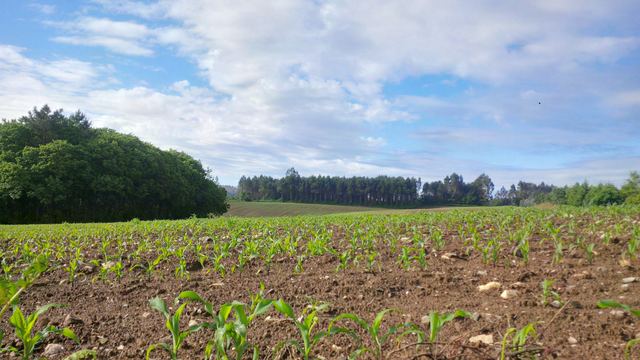By Chang Xin, USA
Through a quiet path, I arrived at my friend’s organic farm, which was far away from the noisy city. The natural scenery came into my sight. White clouds were floating in the blue sky. A breeze came up, and the fresh air made me suddenly feel refreshed and lifted my spirits.
I looked around: Singing birds and fragrant flowers characterized a fine spring day. Pink, yellow, white and hyacinthine wild flowers bent before the spring wind. I got down to look carefully and found some little snails in the grass; I listened carefully and heard the little hidden insects making their unique sound rising one after another. In the distance, tender vegetables were standing in rows, rushing to stretch out; accompanied by the birds’ singing, farmers were busy working in the farmland. What a beautiful picture it was!
Looking at the woods around the farm, my friend told me that all the vegetables and fruits growing on the farm were organic, without any biocide or chemical fertilizer. And the trees around were used to prevent pesticide from other places. Under my friend’s introduction, I learned that soil is the most important factor to crops. I picked up a handful of soil and looked carefully. The soil was very soft and there were many aggregates. Earthworms casts and excrement of other small animals, as well as some bacteria, cement soil particles together in water-stable aggregates. In hot summer, these are able to store moisture without dispersing, thus protecting the crops.
Walking on a rural road, I saw the weeds flickering freely. Did the farmers loaf on the job of weeding? Actually, farmers kept the weeds intentionally, because the weeds have a specific function—they can prevent soil away. After a rainstorm, they can absorb moisture in the soil to protect the roots of fruits and vegetables from rotting when soaked in the water. Even for the weeds that should be pulled up, like eleusine indica, farmers don’t throw them away, but put them upside down next to the crops until they die naturally. Thus, nutrient in the weeds will return to the earth as natural fertilizer. What’s more, many effective herbal medicines can be found everywhere in the weeds, such as lilac tasselflower that clears heat and damp in large intestine and removes swelling and detoxicating, black nightshade that clears heat and removes toxicity, dandelion that subdues swelling and resolves hard lumps, herba plantaginis that prevents stone, honeysuckle and morning glory that climb plants, etc. It was amazing that treasures were everywhere. So, farmers didn’t need to pull up the weeds, and had unexpected gains.
I saw lablab and peas in the garden, and beside them were corn, fennel, and others crops. My friend told me that vegetables can help each other by growing together. For example, farmers plant bean or pea family with corn. Beans take a magic substance—nitrogenase, which can immobilize the free nitrogen in the air for the corn, while the corn’s stem can be used for the beans’ vines to climb to receive more sunlight. And then I saw a large piece of shiny green vegetable plot. It reminded me of the damage by insects, which was the most painful experience for farmers. I was told that as long as the natural ecological environment is balanced, even if without biocide, vegetables can defense themselves by giving off unique smell to attract pests’ natural enemies to eat up the gluttonous feast of pests. How marvelous it is!
“It’s a snake over there,” said an elder lady in the distance. Seeing her calm look, I wondered: “Why didn’t she scream? If I were her, I must have screamed with fear.” In fact, she had already accustomed to the existence of various animals on the farm. What’s more, snakes are also useful. They can protect the crops by eating rats which destroy crops. Besides, on the farm, there are bees, spiders, snails, various birds, long-horned beetles, toads, tortoise, and so on. They all play their own roles to protect the crops and maintain the ecological balance.
“Cock-a-doodle-do …” With the cocks’ crow, I saw there were many chickens on the farm. My friend said chickens were very useful, too—they can not only lay eggs, but also eat pests. For example, guinea fowls are swift and very good at eating worms. Farmers raise them at where flowers grow. They eat pests and clear up weeds in the flower fields at the same time. As long as they are given a relatively wide aisle to play in, they won’t spoil the flowers. Moreover, chicken feces are natural good manure for the flowering plants.
“Arf, arf, arf …” The bark of a clever border collie attracted me. It was patrolling the farm, watching the livestock as alertly as a guard to prevent them from missing or escaping as well as being attacked by jackals and wolves. It was an indispensable helper.
I took a deep breath of the fresh air, and felt everything here. It was good to rest my eyes on everything here. They were so pleasing. Then my friend shared two passages of God’s words with me: “God created all things, each of which lives through different forms and different ways and uses different methods to exhibit its power and form of life. No matter what method, it is all under God’s rule.” “God created all things and used His own methods to set the laws of growth for all things, as well as their growth trajectory and patterns, and also set the ways all things exist on this earth, so that they may live continuously and depend on each other. With such methods and laws, all things are able to successfully and peacefully exist and grow on this land. Only by having such an environment is man able to have a stable home and living environment, and under God’s guidance, continue to develop and move forward, develop and move forward.”
From God’s words we know that God created the heavens and earth and all things, and set the laws of living and rules for all things. Under such laws, all things play their own roles. For example, earthworms loosen the soil, and meanwhile their excrement can protect the soil from being dried up, so that the crops can be provided with better nutrition; in order not to be damaged by pests, vegetables give off smell to attract the pests’ natural enemies to destroy the pests; weeds can prevent soil away and help soil preserve moderate moisture; beans provide nitrogen fertilizer for corn, while corn provide beans with places to climb; snakes eat mice; chickens eat pests and clean up weeds; dogs guard livestock for people; and so on. From these we see that all things created by God live together, restrain one another and depend on one another. The laws that God sets make it possible for all things to live on the earth, providing mankind a stable living environment to develop one generation after another. All of these are the embodiment of God’s authority. Meanwhile, we can see God spends much effort and makes thoughtful preparation for our existence, and we also experience God’s care and protection for us. We are so blessed to live in the wonderful environment presided and supplied by the Creator, and to enjoy the green food bestowed by God.
Unfortunately, not everyone obeys the laws God sets for all things. Now people keep felling forests for benefits, and use large amount of chemical pesticide to farm. Water and air are polluted, and animals are indiscriminately killed…. Human beings and all things live and die together, and depend on each other. If the ecological environment is destroyed, humans will be the victim in the end, too. Now it is hard for us to eat green vegetables, and we are even deprived of the right to breathe clean air. The original ecological environment that God bestowed us is increasingly being destroyed. Consequently, an increasing number of diseases are falling on us. What should we do?
God’s words say: “So what sort of attitude should man have toward all things? (Treasure them.) Treasure them, protect them, make use of them efficiently, do not destroy them, do not waste them and do not change them on a whim, for all things are from God and are provided to mankind and mankind must treat them conscientiously.” God’s words give us the way of practice: If we want to enjoy everything God gave us, we should do nothing but treasure and protect all things, and learn to take advantage of them efficiently according to the laws and rules God set for us, instead of destroying the ecological environment. Thus, we will be able to receive God’s supply in all aspects.
It was getting dark. The sunset was fascinatingly glowing on the horizon. The wild geese were flying to the south in different team formations. With all things manifesting God’s deeds, I couldn’t help offering my unending gratitude and praise to the Creator.




